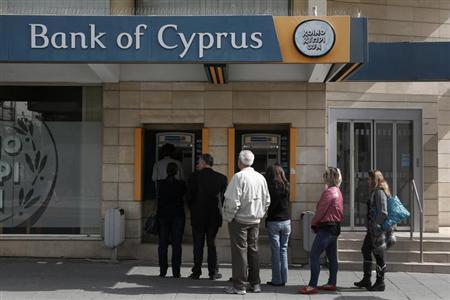
The Cypriot banks offered depositors really good rates of interest – as high as 4.75% for long-term accounts – which attracted not only local people, but also hordes of foreigners.
How could the banks afford to pay such great rates? By investing the money from those “savers” in something that itself paid really great rates of interest: Greek government bonds.
When Greece got bailed out, the value of the bonds was cut in half.
But that wasn’t all. The fat interest rate that those bonds were paying was also cut – to just 3.5%.

That meant Cyprus’ banks had a lot less money coming in the door. But they still had to pay their depositors – and in some cases they’re paying depositors more than they’re getting from the bonds.
In other words, the Cypriot banks are deep in debt, and they’re not making enough money to make their interest payments. They’re on the verge of going bust.
For help, the banks turned first to their European neighbors, who agreed to lend them some cash. They’ve now got more money coming in the door, but it’s not enough. Now they need to attack the problem at the other end, by reducing the amount they owe.
Who do they owe money to? The depositors.
Now, some of those depositors are protected – accounts under 100,000 euros are insured.
Cyprus is taking a big chunk of the money in those accounts – around 40%.
The 40% “tax” on those big accounts does two things. First, it brings money into the door of the banks, giving them more money to operate with. Second, it reduces the amount of interest they have to pay to those account holders each month.